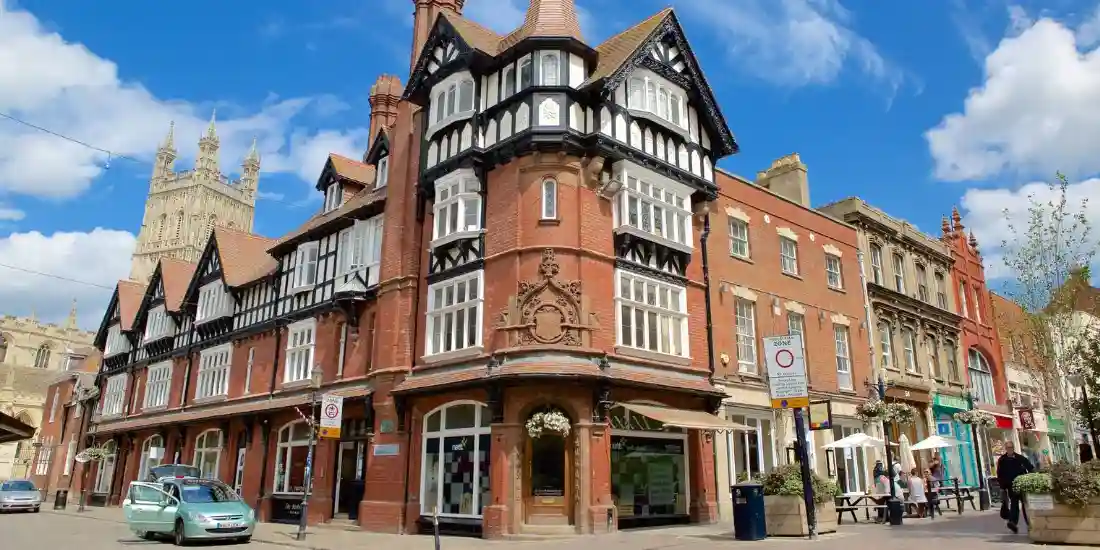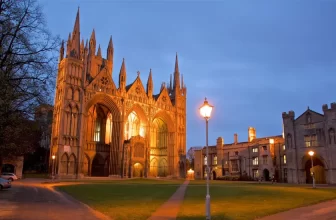
The First Day – What It’s Really Like to Arrive in Gloucester
The first thing you notice when stepping off the train at Gloucester station isn’t the weather (which, let’s be honest, is usually grey)-it’s the quiet charm of the place. There’s this mix of old-school elegance with its cathedral spires, cobbled streets, and Tudor buildings… and you also hear bits of modern life-students laughing outside Costa, a busker playing near the market, delivery vans bumping down narrow streets.
It was early September when I arrived, supposedly the end of summer, but I was already regretting not packing a warmer coat. The air had that crispness to it, slightly damp, with the smell of rain on concrete. I was jetlagged, clutching my phone with one percent battery, trying to figure out where my student housing check-in was. Total chaos, but also, something clicked: I was really starting this new life.
If you’re planning to study abroad and stumbled across this study guide in Gloucester, welcome-you’re in for something unique. This isn’t London. It won’t try to be. But that’s what makes it interesting. There’s a slower rhythm here, more room to breathe, better connections with your uni, and a real sense of community-something I didn’t know I needed until I found it.
Why Choose the Study Guide in Gloucester in 2026?
Let’s be honest-Gloucester probably wasn’t the first city you thought of when considering the UK for studying abroad. And yet, it’s gaining quiet popularity, especially in 2026.
Here’s why:
- As of 2025, the UK has over 680,000 international students, and regional cities like Gloucester are seeing strong increases due to affordability and visa-friendly policies.
- The post-study work visa (Graduate Route) lets you stay in the UK for two years after graduating to job hunt or work without sponsorship (three years if you’ve completed a PhD).
- Industries like digital media, business, education, and health & social care are growing across Gloucestershire-and the local university programs align directly with those high-demand sectors.
But beyond numbers, studying in Gloucester gives you a better shot at balance. You’re not just a student ID number in a 400-seat lecture hall. Profs know your name. You’ll see familiar faces on your morning bus. You can walk from your uni to a 12th-century cathedral in under ten minutes. It blends academic learning with history, nature, and real community.
And cost? Gloucester is reasonably priced compared to London, Manchester, or even Bristol (which is just an hour away by train if you want nightlife or opportunities there too).
So, if you’re asking why 2026, I’d say this: the UK is open for international students, and Gloucester offers a way to get the quality UK education experience without the London price tag or stress.
Why Is Gloucester a Hidden Gem for International Students?
The University of Gloucestershire has built a strong reputation for being international student-friendly, not just in phrases but in practice. You’re not lost in a crowd of thousands, but part of a mix of around 8,500 students, with a steadily increasing number coming from countries like India, Nigeria, China, and the EU.
What makes Gloucester universities for international students stand out is how they mix applied learning with small class sizes and real-life placements.
You’ll be surprised by how accessible the staff are. Some of my friends said they got help with accommodation, job searches, and even GP registration from international advisors on campus. The university’s student support services are no joke. You’ll never just be left to “figure it out.”
And culturally? Gloucester has a down-to-earth, inclusive vibe. You’ll find halal food, a solid international grocery store, and student-organised cultural festivals where people turn up purely to see what’s going on-not just people from that specific background. That kind of natural curiosity and openness shows.
Top Universities and Colleges in Gloucester – Your Academic Study Guide in Gloucester
While Gloucester isn’t a cluster of universities like Manchester or London, it’s home to one key player that international students love for all the right reasons.
University of Gloucestershire
- Ranking: Not in the global top 100, but makes an impact in niche areas
- What It’s Known For: Media production, business, education, nursing, IT, and sport
- Tuition Fees for International Students:
- Undergraduate: £14,700–£15,500/year
- Postgraduate: £15,000–£16,200/year
- Student Vibe: Friendly, creative, not overly competitive. People actually help each other.
- Campus Feel: You’ve got three campuses-Park (business & media), Oxstalls (health, sport, and education), and Francis Close Hall (liberal arts). Each has its own style-Oxstalls has a huge gym and sports focus, and Park looks like a movie set with its greenery and chill spots.
- Notable Programs:
- BA Film Production (industry partnerships + real kit)
- MSc Cyber Security
- MA Education
- BSc Criminology
Students consistently say the big draw is teaching quality + small class sizes + placement links (BBC, NHS, tech start-ups, local councils).
You’re also just half an hour from the Cheltenham campus, which opens you up to more networking, events, and specialized workshops.
Best Student Accommodation Options in Gloucester – Housing Study Guide in Gloucester
Here’s what nobody told me upfront: Dorms in Gloucester fill up fast, but the cost is better than most places in the UK.
Let’s break down your options.
1. Blackfriars Residences (University-managed)
- Cost: £120–£150 per week
- Includes: Wi-Fi, on-site support, laundry, en-suite bathroom
- Distance to Campus: 10–15 minutes to Oxstalls
- Pros: Safe, social, booking through uni is hassle-free
- Cons: Demand is HIGH-apply early
2. Student Digs Gloucester
- Private lettings: rooms in shared houses
- Cost: Around £400–£500/month
- Upside: More independence
- Watch Out: Some landlords aren’t responsive-always view or ask for videos first
3. GlosPads
- Database for international student accommodation Gloucester-wide
- Usually more traditional shared flats
- Price Range: £350–£600 depending on distance and amenities
4. Homestays
- Less common, but offered via uni or host agencies
- Cost: £550–£700/month
- Best for: first-year students wanting a homey environment or parental-like support
Top Student Neighbourhoods – Where to Live in Gloucester as a Student
Here’s what you really want to know-where’s walkable, cheap, and nice enough to not feel like you’re in a student ghetto?
Kingsholm
- Benefits: 15-minute walk to Oxstalls campus, near Kingsholm Rugby Stadium
- Vibe: Quiet residential with old brick houses
- Rent: £400–£550/month
Barton & Tredworth
- Closer to city centre: lots of cultural diversity here
- Food Scene: Good for international groceries and halal snacks
- Affordable: rooms for as low as £350–£450
Longlevens
- Very student-friendly. Away from city buzz, but regular buses
- Rent can be slightly higher-£500 average-but safer and quieter
Cheltenham (near FCH campus):
- Worth considering if you’re on that campus regularly or want better nightlife
- Downside: More travel. But trains are reliable and take 15–20 min.
Cost of Living in Gloucester – Managing Your Finances as a Student
The good news? You don’t need London money to survive.
| Category | Monthly Cost (GBP) |
| Accommodation | £400–£600 |
| Groceries | £100–£180 |
| Transport | £30–£50 (unlimited pass) |
| Phone & Internet | £20–£30 |
| Eating Out | £50–£100 |
| Study Materials | £40 |
| Health Insurance (NHS) | Paid via visa surcharge |
| Entertainment | £50 |
| Total Monthly Budget | £700–£1,000 |
Where students overspend:
- Takeaways (trust me, Domino’s will tempt you)
- Unplanned travel (especially to London)
- Amazon orders
Budget Tips:
- Use UNiDAYS or Totum for discounts
- Shop at ALDI or Lidl-better value than Tesco
- Walk. Gloucester’s walkable. Skip Uber.
Scholarships and Financial Aid for International Students
Government:
- Chevening Scholarships: Full-ride, especially for postgraduate students
- Commonwealth Scholarships: Targeted for low/medium-income countries
University of Gloucestershire:
- Academic Merit Scholarships: Up to £3,000 off tuition
- Sports Scholarships
- Early Payment Discounts available for paying full tuition early
External:
- British Council GREAT Scholarships
- Student Finance (EU only): Limited access post-Brexit
When to apply?
Before April 2026 for most. Aim to apply for both uni admission and scholarship simultaneously.
How to Apply – Step-by-Step Study Guide in Gloucester
- Choose the program via UCAS (undergrad) or direct application (PG)
- Research unis and course codes by October 2025
- Prepare documents:
- Transcripts, Statement of Purpose, reference letters
- Proof of English (IELTS 6.0+)
- Submit your application:
- UCAS deadline: Jan 31, 2026
- PG rolling deadlines: submit early
- Wait for conditional offer
- Meet conditions and accept
- Pay deposit (~£3,000–£4,000)
- Apply for Student Visa (Tier 4)
Visa and Work Rules in 2026 – Stay Cool, It’s Manageable
- Documents Needed:
- CAS from university
- Bank statements (minimum £1,023 per month x 9 months)
- English test
- TB test (country-specific)
- Application Time: Avg 3–5 weeks
- Cost: £490 application + £776 NHS surcharge
Work Rights:
- 20 hours/week during term
- Full-time during breaks
- Access to Graduate Route Visa: 2–3 years of post-study employment
Transport Study Guide in Gloucester
- Buses: First Bus Gloucester pass ~£40/month
- Walking: Most campuses 15–20 min from housing
- Apps: First Bus App, Trainline
- Night Travel? Some late-night buses, but it’s a small city-plan ahead
Pro tip: Students get major discounts-ask your uni for a discounted Travel Card ASAP
Student Life + Culture in Gloucester
- Day-to-Day Vibes: Chill classes, lots of group work, library hours till late
- Food Culture: Not just British fare-there’s Indian, Thai, Turkish food joints dotted around
- Events: On-campus gigs, international nights, poetry slams at Café René
- Fresher Shock: Pubs over clubs, layers of slang, people queuing a lot
What surprised me most? How quickly people open up if you just ask how their weekend was. That and how seriously Glos students take rugby.
Internships and Part-Time Jobs in Gloucester
- Part-Time Jobs at Costa, Primark, libraries, uni cafes
- Careers Centre is actually useful-go to their workshops
- Top Industries: Health and social care, teaching, digital marketing, sport management
- Sites to find work: Indeed, Jobs.ac.uk, LinkedIn
Application Timeline for 2026 – Month-by-Month
| Month | Action |
| Oct–Nov 2025 | Research courses, shortlist unis |
| Dec–Jan 2026 | Submit UCAS / PG applications |
| Feb–March | Scholarships and funding |
| April–May | Decisions and acceptances |
| May–June | Visa applications |
| July–Aug | Pay deposit, book housing |
| Sept 2026 | Pack and fly! |
Public vs Private Universities
| Feature | Public (UoG) | Private College |
| Tuition | £14k–£16k/yr | £18k+/yr |
| Class Size | Small–Medium | Varies |
| Recognition | Official UK degrees | Check accreditation |
| Scholarships | More availability | Limited |
| Living Cost | Lower in Gloucester | Often higher |
Final Thoughts – Should You Study in Gloucester in 2026?
Short answer? Yes-if you know what you want.
Gloucester’s not flashy. It’s not massive. But it’s supportive, affordable, and gives you space to grow-while studying at a reputable UK university with solid future prospects.
Perfect for:
- Arts & Media students
- Business or education majors
- People looking for smaller, friendlier cities
Might not be for you if:
- You live for high-energy nightlife every night
- You want a huge international crowd 24/7
Quick Tips Before You Arrive:
- Apply for housing ASAP
- Get your NHS registration sorted early
- Check for scholarships during your program application, not after
- Bring a waterproof jacket, not an umbrella (trust me)
- Ask questions. Always ask.
Top FAQs – Study Guide in Gloucester 2026
Not really. It’s cheaper than most UK student cities. £700–1,000 monthly budget is doable.
Yes, 20 hours/week during term, full-time during breaks.
No, but you’ll need IELTS 6.0+ or equivalent. Most courses are in English.
Yes-walkable, low crime, and people mostly mind their own business.
They exist-but apply early and meet academic/extracurricular criteria.
Yes, via the Graduate Route visa (2 years + more if you get hired).
Start by October 2025. Submit UCAS or PG apps by Jan 2026 at the latest.
Still thinking? Bookmark this study guide in Gloucester-you’ll be glad you did. And if you need help choosing programs, writing your SOP, or getting your visa documents in place, reach out to [Studyabroadadvice.com]. We’ve got your back.






